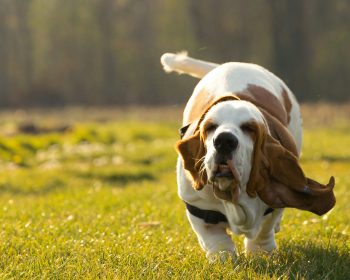Basset Hounds, with their distinctive long ears, droopy eyes, and short legs, are one of the most easily recognizable dog breeds. Originally bred in France for hunting, particularly using their powerful sense of smell to track small game, they are now beloved companions known for their gentle and laid-back demeanor. Despite their somewhat comical appearance, Basset Hounds possess a noble bearing and an unmatched olfactory prowess. Alongside their hunting skills, these dogs exhibit a range of quirky behaviors that can be both charming and perplexing to their owners. These habits often stem from their scent-driven nature and their historical roles as trackers and hunters. This article delves into seven of the most unusual habits of Basset Hounds, exploring the origins and implications of each behavior and providing insights on how owners can manage these distinctive traits effectively.
1. Excessive Howling and Baying
Basset Hounds are known for their deep, melodious howling and baying, a behavior that is particularly pronounced when they pick up an interesting scent or when they want to alert their owners to something important. This vocalization is a carryover from their days as hunting dogs, where howling helped communicate their location to hunters from a distance. While endearing, this can be problematic in urban environments or apartment settings where noise is a concern. Training to manage vocalization, using commands like “quiet,” and ensuring they get plenty of physical and mental stimulation can help mitigate excessive howling.
2. Persistent Sniffing
Due to their breeding as scent hounds, Basset Hounds have an ingrained habit of following their noses, often leading to persistent sniffing whenever they are outside. This can make walks challenging, as they may stubbornly track scents rather than follow the planned route. To manage this behavior, it’s important to allow time for sniffing during walks as a form of mental exercise but also teach them commands like “leave it” or “let’s go” to keep them moving.
3. “Counter Surfing”
Despite their short stature, Basset Hounds are surprisingly adept at “counter surfing” — reaching up onto counters in search of food. This behavior is driven by their strong food motivation and can be quite problematic, especially when it leads to the consumption of potentially harmful foods. Keeping counters clear of food and using deterrents like double-sided tape can help discourage this behavior. Additionally, consistent training to obey boundaries and providing adequate meals and treats will keep their food-seeking behavior in check.
4. Slobbering
Basset Hounds are notorious for their drooling, especially after drinking water or when they smell delicious food. Their loose, fleshy lips contribute to this slobbering, which, while natural, can be a bit messy for owners. Keeping towels handy to wipe their mouths and maintaining a clean eating area can help manage this drooly disposition. Regular checks and cleaning around their mouth can also prevent any skin irritations or infections caused by excessive moisture.
5. Social Sleeping Habits
Basset Hounds often exhibit social sleeping habits, preferring to sleep near their owners or other pets. This behavior likely stems from their pack-hunting heritage, where staying close to the pack was crucial for safety and warmth. Providing a comfortable bed near where family members relax can satisfy this need for closeness. This habit underscores their sociable nature and need for companionship.
6. Stubbornness
Known for their stubborn streak, Basset Hounds can sometimes be challenging to train, particularly if they are not motivated properly. This trait was useful in hunting scenarios, where they had to be persistent. Patience, consistency, and finding the right motivators, such as treats or favorite toys, are key to successful training sessions with a Basset Hound. Positive reinforcement techniques can encourage cooperation and help overcome their sometimes obstinate behavior.
7. Digging
Basset Hounds may also engage in digging, a behavior that can be traced back to their need to unearth scent trails while hunting. This can lead to destroyed gardens or messy lawns. To counteract this, providing a designated digging spot in the yard can allow them to indulge in this behavior without damaging other areas. Engagement in other forms of exercise can also help reduce their impulse to dig.
Basset Hounds are a delightful breed with a combination of endearing quirks and challenging behaviors that reflect their scent-driven nature and hunting background. Understanding and properly managing these habits through training, environmental management, and regular exercise can help ensure that Basset Hounds are well-behaved and integrated family members. Their distinctive behaviors require patience and understanding but make them uniquely beloved companions.
The post The 7 Most Unusual Habits of Basset Hounds appeared first on iHeartDogs.com.

